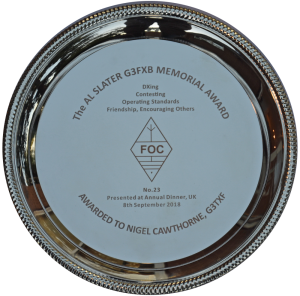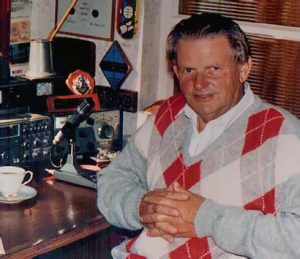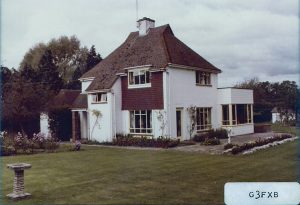
The Al Slater G3FXB Memorial Award is FOC’s highest accolade. It is one of the most prestigious awards in amateur radio, presented annually by the Club.
Al became a Silent Key on 11 November 1992. He was the back-bone of the First Class CW Operators’ Club for many years, especially after Bill Windle G8VG passed away. Al was President in 1970, served as Secretary 1981-87, then as Chairman until 1992 with a total of 22 years on Committee.
The award is presented once a year to an individual, group or society that has, in the judgement of the Committee, made an outstanding contribution to the hobby that reflects the attitudes and approach of Al Slater. This came from exemplary and considerate operating standards and a high level of encouragement, friendship and support given to other amateurs, especially newcomers. Al’s whole approach to amateur radio, indeed to many aspects of life itself, was something that others appreciate, look up to and seek to emulate.
See here Al Slater, G3FXB Memorial Award past recipients.
Remembering Al Slater, G3FXB
Obituary by Dennis Andrews F5VHY (G3MXJ) in 1992

The passing of Al Slater, G3FXB, on 11th November, represents a landmark in the history of both FOC and amateur radio. His broad interests covered DXing, contesting and ragchewing, together with his love of the social scene made his callsign one of the best known of any on the HF bands.
Al joined FOC in 1953 and the club records reflect a developing deep involvement in the Club’s activities. In 1970, he was the 10th President of FOC. He joined the Committee in 1979 and, working closely with Bill Windle, G8VG, was instrumental in seeing the Club through some difficult years. He took on the job of Secretary between 1981 and 1987 and was made a Vice-President in 1986. In 1987, he was appointed Chairman and held that post, together with that of Treasurer, at the time of his death. His outstanding achievement was the building of FOC into the world respected organisation that we have today.
Al’s introduction to radio was through medium wave broadcast listening in the mid 1930s. He would burn the midnight oil, logging the US transmissions which often carried elements of his other great love – jazz. G3FXB took to the air in 1949 – at first a fairly restricted setup at his parents house in Hove. Later, in 1953, he moved to Southwick, close to his TV and radio business. It was from here that his involvement with the hobby really began to develop. Even though the backyard was fairly small, in typical fashion, Al made maximum use of every inch of space. The wire beams and, eventually, a crank-up tower and quad became landmarks along the south-coast road that ran nearby.
Al’s style very much emphasised the alternative meaning of FOC – Friends Over Continents.
When Al and Maud moved to Wychwood, in 1974, the house very soon became a centre for all that is  best with amateur radio. During the next 18 years, they entertained no less that 303 different callsigns and Al reckoned that he had personally met over 80% of the FOC active list. No-one who has ever been there on the Sunday after Lords, will ever forget the magic atmosphere. Most years the sun shone. Old friends would stroll around the garden catching up with the year’s news. The group photo was a tradition of the day and a collection extending over many years forms a valuable part of the club records. As well as the parties, there was always a stream of individual visitors. Virtually no DXer or contester of any note, FOC or otherwise, would pass through the UK without calling.
best with amateur radio. During the next 18 years, they entertained no less that 303 different callsigns and Al reckoned that he had personally met over 80% of the FOC active list. No-one who has ever been there on the Sunday after Lords, will ever forget the magic atmosphere. Most years the sun shone. Old friends would stroll around the garden catching up with the year’s news. The group photo was a tradition of the day and a collection extending over many years forms a valuable part of the club records. As well as the parties, there was always a stream of individual visitors. Virtually no DXer or contester of any note, FOC or otherwise, would pass through the UK without calling.
Those who have never visited Wychwood could feel something of the atmosphere, through Al’s individualistic editorials in the News Sheet that kept the reader up to date with the changing seasons in the Sussex countryside and the progress, or otherwise, of the environmentally friendly vegetable garden.
The News Sheet also recorded happenings at the local country pub – The Bridge. The landlord, Malcolm, and his usual customers, quickly became accustomed to regular visits from a whole range of people from overseas. Those with an interest in jazz would often be invited to one of the live music evenings. There were also many memorable evenings where the local FOC, DX and contesting group would meet for dinner with a visitor.
From the early 1970s onwards, Al and Maud became ardent travelers. Early visits to the US cemented a lot of close friendships which continued over the air through regular skeds. Al was a great supporter of the Mini-Dinner concept that encouraged groups of members to organise meetings in different parts of the world. The US trips became virtually annual appointments at Spring Valley Danbury and, later, Washington. On later visits, they went to the mid-west, Texas and California. In 1981, they visited Australia, enabling Al to meet more of the friends that he had talked to over the years. A subsequent visit, in 1987, took in Hong Kong and New Zealand.
A by-product of Al’s supreme interest in the field of contesting was his close friendship with some of the leading amateurs in Russia. The ending of the cold war gave him the opportunity to consider meeting some of those that he had talked to for so many years. In July 1986, Al and Maud were amongst the first western visitors to take advantage of the rapidly thawing situation and visited Moscow and Leningrad. It is interesting to note, in Al’s write-up of the visit, (September 1986) that he only felt it safe to mention the callsigns of the ‘officials’ that he met at the Central Radio Club. This first visit was followed by further trips to the Ukraine and to Leningrad. It was during one of these trips that Al became the first person to put FOC on the air from Russia.
It is difficult to know where to start when one talks of Al’s DXing and contesting achievements. He reached the top of the DXCC Honor Roll in 1975. In May 1988 he was only the third amateur to be elected to the CQ Contest Hall of Fame, in company with K2GL and KH6IJ. There was no major contest in which he had not attained top honours. The CQ Contest was a special challenge and he had, at various times, held a number of continental records on both CW and SSB. The RSGB Commonwealth Contest, with its unique demands on equipment, antennas and, above all, propagation knowledge, was an annual favourite. He first won the Thomas Trophy, for the leading UK station in 1973 and went on to capture it on a total of 18 occasions and, in 1990, won the Senior Rose Bowl, for the leading station overall, when operating as ZC4ESB.
It is interesting to reflect that all of his operating achievements were accomplished without massive financial investment. Although a T5930 appeared in recent years, the Drake C-line remained the workhorse. Outside, Al took great pride in home made antennas. The home-brew four element quad and the fixed wire beams on 40 metres produced one of the outstanding signals from the UK.
Al constantly confounded the theory that a contester should complete his desired achievements before the age of 40. He was always planning the next event and considering what antenna changes or station modifications would be needed to keep up with the changing demands. At the time of his death, he had just completed his log for the CQ SSB event and was turning his thoughts to the CW weekend and to an overseas participation in the Commonwealth Contest in 1993. Plans were also well advanced for the usual visits to Visalia, Dayton and Washington.
The funeral was held at Worthing Crematorium on 18th November. Al had left a number of instructions and these were carried out to the letter. The chapel was filled to overflowing with relatives and friends, including a large number of amateurs. The ladies wore something colourful and even Al would have been taken aback by the brightness of some the men’s ties. The service was conducted to the music of Glenn Miller. Al’s ashes will be scattered at Wychwood, amongst the acres where he spent so many happy hours. By request, there were no flowers. Instead, donations were given to two charities – the Council for the Protection of Rural England and the Marie Curie Memorial Foundation. About 40 guests returned to Wychwood during the afternoon, where the atmosphere reflected the best aspects of the FOC spirit – friendship and support.
FOC and amateur radio has lost a figurehead. The family, Maud and the children – John, Phillip, Susan, Jackie, Linda and Diane – together with the ten grandchildren, has lost a charismatic head. The gap that is left will take a long time to close. The outstanding contribution to the Club and the influence that was exerted on the hobby, will be felt for many years to come.

